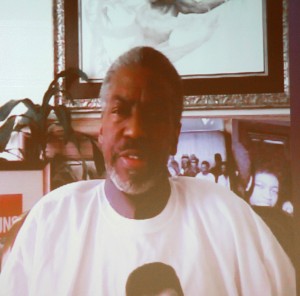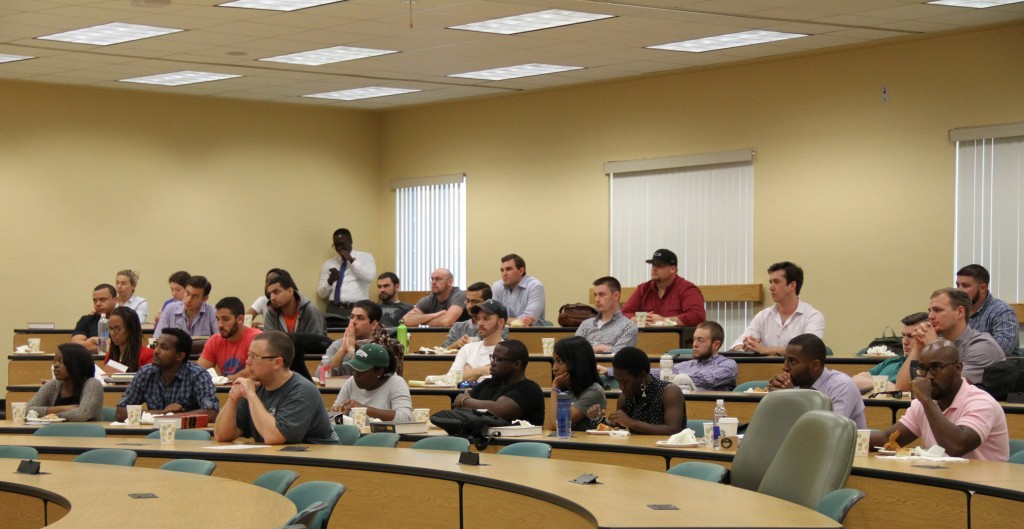Rev. John C. Williams spoke with Stetson law students about an overlooked hero of the civil rights movement

Rev. John C. Williams spoke with Stetson law students via Skype on Feb. 23. Photo by SeanCarlo Lopez.
The son of civil rights era activist Robert F. Williams, the Rev. John C. Williams, spoke with Stetson law students on the Gulfport campus on Feb. 23.
After sharing a first-hand account of what the struggle for basic human rights was like for African-Americans during the American civil rights movement in the 1950s and 1960s, Rev. Williams described how the Second Amendment can be used to preserve the First Amendment.
“When there is no legal recourse, when the courts turn you away, when people are oppressed, people have the right to secure basic human rights by any means necessary,” said Rev. Williams.
The Rev. Williams’ father, Robert F. Williams, led the Monroe, North Carolina, chapter of the National Association for the Advancement of Colored People during an era when white supremacists regularly targeted African-Americans. Robert F. Williams is the author of Negroes with Guns.
“Despite the nonviolent teaching of the NAACP, life lessons taught Mr. Williams that it was necessary to advocate for armed resistance and self-defense against the Ku Klux Klan,” said Diriki Geuka, a second-year student at Stetson law school who helped coordinate the event.
During the civil rights era, Robert F. Williams petitioned the National Rifle Association for a charter, which was subsequently granted, and formed an armed band known as the Black Guard to defend the Monroe, North Carolina, community from terrorism by white supremacists. The NAACP suspended Williams for advocating violence. Facing arrest for fabricated kidnapping charges, Williams fled to Cuba with his family where he and his wife started the radio program, “Radio Free Dixie.” He later moved to China before being cleared of all charges and returning to the U.S. in 1969 and joining the Institute for Chinese Studies at University of Michigan as a research associate.
“Hearing the history of how Robert F. Williams challenged not only white supremacists but also Martin Luther King Jr. and the entire civil rights establishment was inspiring,” said Professor Judith Scully, co-director of Stetson’s Social Justice Advocacy program. “His story tied the freedom struggle in the rural black South to politics, black cultural pride and armed self-reliance, a history that is often ignored.”
“Black History Month is often a time when routine lessons are taught about a select few civil rights heroes,” said Geuka. “Because of the emphasis on nonviolence that is often associated with the civil rights movement, the contributions of men like Robert F. Williams are often overlooked.”

Dozens of Stetson law students attended Williams’ talk on Feb. 23 in Classroom A. Photo by SeanCarlo Lopez.
“The event made me realize how the system of law we have here in America is not perfect,” said third-year student Patrick Iyampillai, president of the Jewish Law Students Association. “Just 50 years ago, equal citizens under the law of the Constitution were under fire for the color of their skin.”
“It was both humbling and motivating to see such a diverse crowd appreciating the gravity of what Rev. Williams had to say concerning his father’s approach to the civil rights struggle,” said student Zachariah Wade, founder of The Pillars.
“This was one of the best events I’ve been to since I started at Stetson Law,” said second-year Stetson Law student and Federalist Society president Christian Romaguera, who attended the event. “It was incredible to hear Mr. Williams speak about his experiences and those of his father’s. His father’s goals, actions, and accomplishments were nothing short of heroic.”
“Today, I walked away with a deeper respect for the Second Amendment and for African-American history,” said first-year student Alexis Turner-Garris. “Any diversity initiative at Stetson should aim to give students these kinds of experiences, experiences that challenge our beliefs and broaden our understandings.”
The Second Amendment Society, The Pillars and the Federalist Society co-sponsored the event. The Second Amendment Society was launched in the fall of 2015 by Geuka, society president Eric Reuter and Kenneth C. Smith. Reuter discovered the story of Robert F. Williams while researching a seminar paper on the Second Amendment and reading about the McDonald v. Chicago case and widespread efforts to disarm African-Americans after the Civil War.
“To my surprise, I realized that the civil rights movement has a hidden history, one where some of its champions took up arms and courageously fought back against their oppressors,” said Reuter. “Robert F. Williams was at the epicenter of that movement in the 1950s and 1960s.”
Reuter said that a GoFundMe page has been created to assist Rev. Williams in covering medical expenses.
Post date: Feb. 24, 2016
Media contact: Kate Bradshaw
[email protected] | 727-430-1580